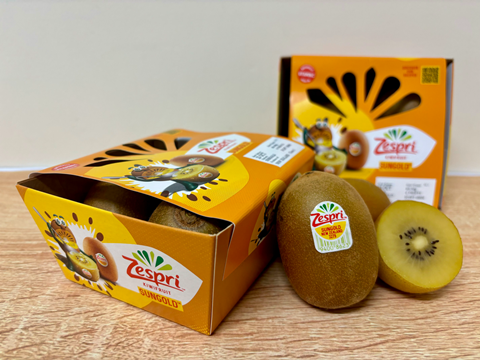
In a cross-industry collaboration, Tesco and Zespri have debuted a kerbside recyclable tray and linerless lid solution for kiwi packaging – aiming to cut down on carbon footprint and transition away from the traditional plastic flow wrap.
Approved for use in individual kiwi packs, the new packaging comprises a cartonboard tray supplied by Smurfit Westrock and a linerless Fruit Lid. This fully integrated packaging solution – referred to as ‘ProProduce’ by ProPrint Group – is expected to negate the need for traditional plastic flow wrap solutions and claims to be kerbside recyclable.
In redesigning the pack, Tesco and Zespri sought a more practical, fully recyclable solution that enhances a kiwi’s visual appeal with a ‘fresh and vibrant’ aesthetic. As such, ProPrint Group has applied the orange and yellow graphic design to both the Fruit Lid and the tray in a bid to reflect the fruit’s taste and ripeness.
Sections of the Fruit Lid are die-cut to resemble the ‘sun rays’ in Zespri’s logo, with specialty tooling cutting the carton and removing waste at high speeds – a factor set to make the product commercially viable for larger volume runs.
Meanwhile, Ravenwood Packaging’s Nobac 5000L linerless applicator is used to apply linerless Fruit Lids to the carton trays. Linerless labels do not require backing paper on the reel; instead, strips of adhesive and silicone are used on their underside and surface to stick to themselves.
Removing the liner is thought to lower CO2 emissions ‘significantly’, cutting down on unnecessary material use and keeping waste out of landfill.
The applicator reportedly operates at a speed capacity of 70 packs per minute, which is expected to help meet order fulfilment lead times. The Nobac 5000L can also link to various manufacturers’ weigh-scales, unlocking variable-weight products and check weighing.
Additionally, Smurfit Kappa has supplied the new wholesale box.
Altogether, the solution is anticipated to boost on-shelf appeal, facilitate easy recycling, cut down on carbon footprint, and help facilitate a wider circular economy.
This marks Tesco’s first departure from its private-label kiwi branding to showcase a branded kiwi product in-store. Several trade marketing activities were utilized to promote the newly branded packs, including online banners, radio advertising, and consumer sampling.
Each was intended to raise consumer awareness, drive engagement, and increase sales, with a marketing campaign throughout the summer said to have surpassed forecasts.
In another fruit-related move, Tesco’s avocado products have trialled a recyclable cardboard container alongside laser etching product information directly onto the fruit’s skin. Utilizing technology from Westfalia Fruit, these solutions are hoped to save nearly a million stickers and up to 25 million plastic trays in the retailer’s avocado product lines.
However, Tesco and Sainsbury’s have recently come under fire for removing the rigid lids from their own-brand houmous pots. While the supermarkets aim to save 50 million pieces of plastic every year, consumers have complained that the new pack is harder to reseal and keep fresh, which also makes the product more likely to spill in storage.
On the subject of fruit, Aldi is also pursuing the removal of unnecessary plastics from its packaging. This summer, it has trialled a paper band for its bananas in hopes of remove 234 tonnes of plastic packaging from its annual operations; it has also removed plastic punnets and pulp trays from various fruit and vegetable lines to cut 370 tonnes of plastic and packaging across all its stores every year.
If you liked this story, you might also enjoy:
The ultimate guide to the Packaging and Packaging Waste Regulation in 2024
How are the top brands progressing on packaging sustainability?
Sustainable Innovation Report 2024: Current trends and future priorities
Everything you need to know about global plastic sustainability regulation














No comments yet